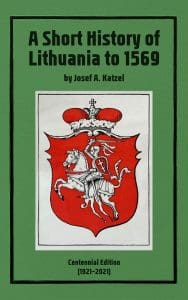About A Short History of Lithuania to 1569: Centennial Edition (1921–2021) By Josef A. Katzel
Why did Lithuania’s dictator in the 1920s (the pro-Nazi Augustinas Voldemaras) kick the author out of the country for writing this seemingly harmless book? What was the significance of the fact that the author’s father tutored a teenage Lenin while both were in law school in Russia in the 1880s? And how was this ground-breaking equivalent of “Lithuanian History for Dummies” a century ahead of its time?
This centennial edition of a ground-breaking classic, translated from the original Russian into smooth and idiomatic English, with numerous images that bring the story to life, includes an introduction written by the author’s grandson—a Harvard graduate and PhD in political science—in which he describes the detective work through which he solved various mysteries relating to the book. He also describes three interesting parallels that were impressed upon him, including the striking similarities between the dictator Voldemaras and the present-day American authoritarian politician Donald J. Trump.
In a sense, this book represents a case study in the power of the written word and the repercussions that its exercise can generate. It is also a story of an oppressed minority people struggling mightily to break free from centuries of vicious prejudice. One hundred years later, at a time of heightened assault on both truth and freedom of speech worldwide—with authoritarianism steadily on the rise—these themes remain as timely as ever.
Buy the book, and follow the author on social media:
Author Bio:
Josef A. Katzel (1890–1930) graduated with distinction from the Department of Economics at Russia’s prestigious Petrograd Peter the Great Polytechnic Institute in December 1916, with a specialization in political economy. Soon after the Bolsheviks came to power in the October 1917 Revolution, Katzel fled with his family to neighboring Lithuania, just as it was declaring its independence from what had been Imperial Russia.
There he authored his groundbreaking HISTORY OF LITHUANIA, the first 20th-century Russian-language history of Lithuania presented as a highly accessible text for a general, non-academic Russian-speaking readership, which represented a substantial portion of the country’s population at the time. After Augustinas Voldemaras (1883–1942), a Lithuanian nationalist/fascist political figure with ties to Hitler came to power through a coup d’état in 1926, Katzel and his family were promptly expelled from the country, following a scathing review that the dictator himself had written of the book.
The irony of the pretext under which Katzel and his family were baselessly deported from Lithuania—that they were Russian spies—is that as they were being expelled for non-existent espionage, the real Russian spies who were observing the author’s movements in Lithuania were taking notes and sending back their intelligence to Moscow. Just as the tsarist secret police had followed his father, so the Soviet secret police considered Katzel important enough to keep tabs on him while abroad—first in Lithuania and later in Germany—describing him in their notes as “a public figure and community activist.” They literally followed him to his grave, noting his time of death in Berlin and the cemetery in which his remains were interred in March 1930.
